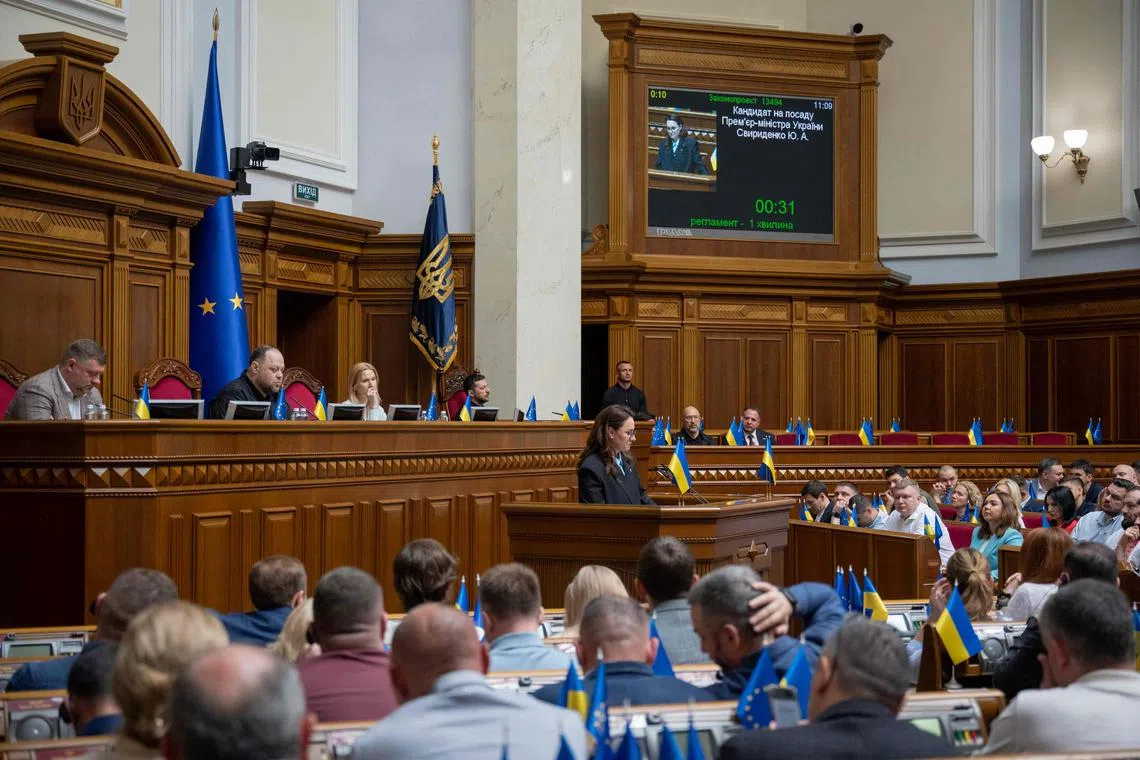Lawmakers in Ukraine vote to curb autonomy of anti-graft agencies
Sign up now: Get ST's newsletters delivered to your inbox

Ukraine’s Parliament passed a Bill on July 22 that tightens control over two key anti-corruption agencies at the centre of the government’s reform drive.
PHOTO: AFP
Follow topic:
- Ukraine's Parliament voted to tighten control over anti-corruption agencies, giving the general prosecutor more power over NABU and SAPO.
- NABU chief Semen Kryvonos urged President Zelenskyy not to sign the Bill, calling it an attempt to "destroy" anti-corruption efforts.
- The EU expressed "serious concern," with Commissioner Marta Kos stating the move undermines rule of law and accession talks.
AI generated
KYIV - Ukraine’s Parliament voted on July 22 to tighten restrictions on two key anti-corruption agencies at the centre of the government’s reform drive, rolling back their autonomy in favour of tighter executive control.
Stamping out endemic graft is a key requirement for Kyiv to join the European Union, as well as to secure billions in Western aid.
Independent investigators have in recent months embarrassed senior officials with allegations of corruption.
The July 22 vote paves the way for the general prosecutor, appointed by the president, to gain more control over the National Anti-Corruption Bureau of Ukraine (Nabu) and the Specialised Anti-Corruption Prosecutor's Office (Sapo), several lawmakers said.
On July 21, Kyiv’s domestic security agency arrested two Nabu officials
Critics and the two agencies said the crackdown went too far.
No senior official has publicly commented on the reasoning for the July 22 draft law, which would allow the general prosecutor to transfer cases from the agencies and reassign prosecutors.
President Volodymyr Zelensky’s office did not immediately respond to a request for comment.
Speaking to reporters in Kyiv, Nabu chief Semen Kryvonos urged Mr Zelensky not to sign the Bill, which he described as an attempt to “destroy” Ukraine’s anti-corruption infrastructure.
Ukraine’s government bonds fell more than 2 per cent in the international markets, with the bulk of the US$20 billion (S$25 billion) of debt it restructured in 2024 down over one cent at between 45 cents and 50 cents on the dollar.
Pressure on agencies
EU enlargement commissioner Marta Kos said she was “seriously concerned” by the vote.
“The dismantling of key safeguards protecting Nabu’s independence is a serious step back,” she wrote on social media platform X, adding that rule of law was at “the very centre” of accession talks.

Nabu chief Semen Kryvonos urged Ukrainian President Volodymyr Zelensky not to sign the Bill that was approved by Ukraine’s Parliament.
PHOTO: REUTERS
Nabu and Sapo were established after the 2014 Maidan revolution that toppled a pro-Russian president and set Kyiv on a Western course.
The two agencies have stepped up their work since Russia’s full-scale invasion, levelling charges against lawmakers, ministers and a former deputy head of Mr Zelenskiy’s administration.
Anti-graft campaigners have been alarmed since the authorities charged a top anti-corruption activist earlier in July with fraud and evading military service.
Critics have cast those charges as political retribution for exposing corrupt officials.
‘Most dangerous moment’
A Western diplomat familiar with Ukraine’s reform effort described the developments as “the most dangerous moment” yet for the independence of anti-corruption authorities.
“The Ukrainian side is testing the limits more and more,” the person said, referring to the patience of Kyiv’s allies.
The government also faced criticism for rejecting the candidacy of an economic security chief and current Nabu detective who was unanimously backed by an internationally supervised committee.
Many influential Ukrainians lashed out after the July 22 vote, saying it was a betrayal of Ukraine’s decade-long geopolitical ambition.
“What kind of European integration can we talk about now?!!!!” wrote Mr Serhiy Prytula, a prominent crowd-funder for the military and one-time politician, on X.
“A bloody shame.” REUTERS

